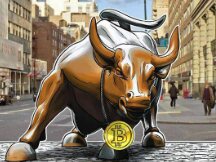Cliff crash! Why Bitcoin Suddenly Plunged Over 20% ...
The market slowed on Friday with a collapse in US commodities and China's stock strategy “Chinese Stock”. Bitcoin and other digital currencies also started falling across the board soon on Saturday night (December 4) (EST). . .
Bitcoin fell more than 20% in less than an hour, according to data from CoinDesk, hitting nearly $ 42,000, its lowest level since September 30, and down almost 30% from its high from November 10 of this year.
It's also worth noting that after the Eastern US market opened on Friday, Bitcoin fell below $ 50,000 in a fraction, and the day before by $ 10,000. , down more than 16% to $ 57,000, still lower than the market opened on Friday.

(Source of screenshot: CoinDesk)
Despite all the results of the digital rebound, data from BTC123.fans shows that, according to the press release, nearly 270,000 people in total have completed their jobs in the past 24 hours, with earnings in the past 24 hours reaching 1.567 billion. . The US dollar has exploded in the past 24 hours. The value of the wallet is 474 million for Bitcoin and 364 million for Ethereum.
(Source of screenshot: BTC123.fans)
Three things will take the leap.
Due to the instability of digital backgrounds, crashes or flash surges frequently occur. The disappointment can be as small as a business thought, a global trade shock, fake news or tweets.
As for the cause of the light loss, foreign media generally believe that the current market is affected by the spread of the disease by a new virus, Omi Keron. Conical inflation, recent inflation in Europe and the United States, and the continued expansion of examples of financial regulation in many countries have contributed, directly or indirectly, to the explosion of this currency market. digital.
In addition, over-trading is also a key factor in the Bitcoin flash crash, according to an investigation by Noelle Acheson, market analyst at Genesis Global Trading, a digital finance company. For example, Binance, the world's largest digital exchange bureau, offers its users "leveraged tokens (LT)". Simply put, if the market value goes up by $ 1, you can earn $ 3 using leveraged tokens, but if the market value goes down $ 1, the leveraged tokens also lost $ 3. This LT directly increases the risk of digital returns.
The point that most LT users criticize is that if the $ 100 investment loses 10%, only $ 90 is left, and if 10% profit is made the next day, only 10% income from a base of $ 90. In the end it can reach $ 99. If the investment falls, it needs more profits than losses to reach equilibrium. Due to the nature of LT, these losses are non-existent and efforts are made to improve corrosion resistance. It also results in greater wear of the LT compared to commercial products that use traditional products, and if the LTs fall off, more recovery is required to achieve the desired consistency.
However, despite its drawbacks, global consumer demand for leveraged tokens continues to grow.
The law should be the future of cryptocurrencies
Against the backdrop of the ever-increasing size of the cryptocurrency market and risk-taking behaviors, global regulators have also become one after another. Current national oversight includes investor protection, financial system protection and financial crime compliance, access to banks and financial protection, payments, and tax exemption matters.
In July and August of this year, Binance, the world's largest cryptocurrency exchange, banned certain cryptocurrency products in the UK, Italy, Germany, the Netherlands, Japan and Hong Kong. In the United States, Treasury Secretary Yellen and Fed Chairman Powell have discussed these issues. Minneapolis Federal Reserve Chairman Kashkari has said that Bitcoin, the world's largest cryptocurrency, is a non-profit cryptocurrency and largely linked to fraud and hype. It has also raised serious criticism.
In China, in 2017, the People's Financial Corporation of China, together with the Central Cyberspace Bureau and seven other departments, announced the "Security Protection Notice of Token Issuance Funding". ).
On September 24, 10 departments, including the People's Finance Company of China, announced the "Notice on the prevention and operation of media security. Issue virtual currency" (hereinafter referred to as the "Notice") on establishment of the Party Central Committee and the State Council, and is required to do so without interfering with the implementation of human development strategy and human development strategy.

Scan QR code with WeChat






























